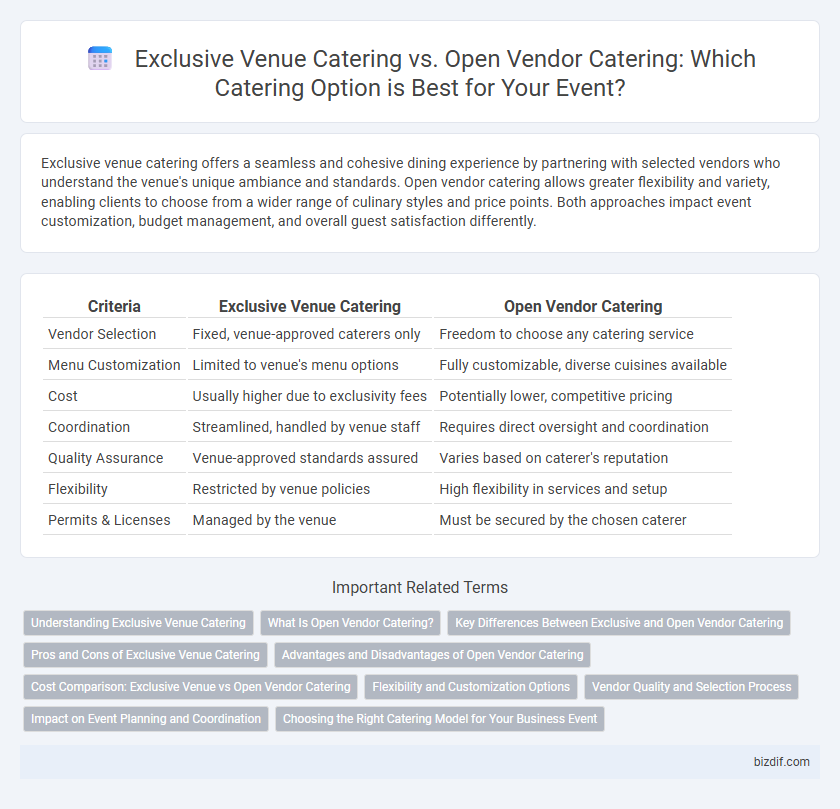Exclusive venue catering offers a seamless and cohesive dining experience by partnering with selected vendors who understand the venue's unique ambiance and standards. Open vendor catering allows greater flexibility and variety, enabling clients to choose from a wider range of culinary styles and price points. Both approaches impact event customization, budget management, and overall guest satisfaction differently.
Table of Comparison
| Criteria | Exclusive Venue Catering | Open Vendor Catering |
|---|---|---|
| Vendor Selection | Fixed, venue-approved caterers only | Freedom to choose any catering service |
| Menu Customization | Limited to venue's menu options | Fully customizable, diverse cuisines available |
| Cost | Usually higher due to exclusivity fees | Potentially lower, competitive pricing |
| Coordination | Streamlined, handled by venue staff | Requires direct oversight and coordination |
| Quality Assurance | Venue-approved standards assured | Varies based on caterer's reputation |
| Flexibility | Restricted by venue policies | High flexibility in services and setup |
| Permits & Licenses | Managed by the venue | Must be secured by the chosen caterer |
Understanding Exclusive Venue Catering
Exclusive venue catering offers a streamlined and cohesive experience by partnering with a single, hand-selected culinary team that understands the venue's unique features and guest preferences, ensuring high-quality service and customized menu options. This arrangement enhances event coordination and consistency, reducing logistical challenges and communication errors common with open vendor catering. Clients benefit from tailored menus, premium ingredients, and seamless integration with the venue's ambiance, elevating the overall event experience.
What Is Open Vendor Catering?
Open vendor catering allows clients to hire any catering service of their choice, providing flexibility and customization for events. This approach contrasts with exclusive venue catering, where the venue mandates the use of its in-house catering team, often streamlining coordination but limiting vendor options. Open vendor catering is ideal for clients seeking personalized menus and unique culinary experiences beyond the venue's standard offerings.
Key Differences Between Exclusive and Open Vendor Catering
Exclusive venue catering offers a curated menu and seamless coordination by a dedicated culinary team, ensuring consistent quality and a streamlined event experience. Open vendor catering allows clients to select multiple external food providers, offering diverse menu options but requiring more logistical management and coordination. Key differences include control over food quality, vendor flexibility, pricing structures, and potential restrictions imposed by the venue.
Pros and Cons of Exclusive Venue Catering
Exclusive venue catering offers the advantage of streamlined coordination, ensuring consistent quality and seamless service tailored to the venue's specific facilities. This approach often includes professional staff trained exclusively for the location, which can enhance guest experience and reduce logistical challenges. However, it may limit menu flexibility and increase costs compared to open vendor catering, where clients can select from a wider range of external providers.
Advantages and Disadvantages of Open Vendor Catering
Open vendor catering offers flexibility by allowing event hosts to select from multiple suppliers, often resulting in diverse menu options and potentially lower costs. However, managing multiple vendors can increase logistical complexity, risk inconsistencies in food quality, and require more coordination effort compared to exclusive venue catering. This approach may benefit events seeking customization but demands thorough vendor vetting to ensure reliable service delivery.
Cost Comparison: Exclusive Venue vs Open Vendor Catering
Exclusive venue catering often includes bundled services such as venue, staffing, and decor, which can lead to higher upfront costs but simplifies budgeting by consolidating expenses. Open vendor catering typically offers more flexibility and competitive pricing by allowing clients to hire multiple vendors, potentially reducing overall costs through selective negotiation and package customization. Comparing both options requires analyzing hidden fees, minimum guest counts, and service charges to determine the most cost-effective solution for the event's scale and requirements.
Flexibility and Customization Options
Exclusive venue catering offers limited flexibility as clients must choose from a predetermined menu and vendor list, restricting customization options. Open vendor catering provides greater flexibility by allowing clients to select diverse food providers and tailor menus to specific dietary preferences and themes. This approach enhances the overall dining experience by accommodating unique tastes and event requirements more effectively.
Vendor Quality and Selection Process
Exclusive venue catering guarantees a curated selection of vendors who meet strict quality standards, ensuring consistent culinary excellence and seamless service delivery. The selection process involves thorough vetting by the venue, including taste tests, hygiene inspections, and client feedback analysis. Open vendor catering offers broader vendor options but requires clients to independently assess vendor reliability and quality, often resulting in variable service outcomes.
Impact on Event Planning and Coordination
Exclusive venue catering streamlines event planning by offering a single point of contact, ensuring consistent service quality and seamless coordination with venue staff. Open vendor catering provides greater flexibility in menu options and pricing but requires more complex logistics management and communication between multiple providers. Choosing between these options significantly impacts scheduling, vendor collaboration, and overall guest experience.
Choosing the Right Catering Model for Your Business Event
Exclusive venue catering offers a streamlined experience with dedicated staff and menu customization aligned to the venue's standards, ensuring consistent quality and seamless coordination. Open vendor catering allows greater flexibility and a broader range of culinary options by permitting multiple external caterers, ideal for diverse guest preferences and larger events. Selecting between exclusive and open vendor catering depends on budget constraints, event scale, and the desired level of control over food service and vendor management.
Exclusive venue catering vs Open vendor catering Infographic

 bizdif.com
bizdif.com